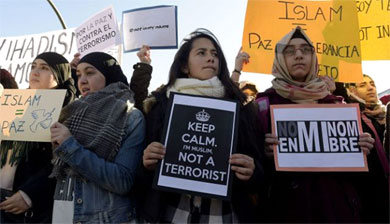By Gershom Gorenberg
Jan. 14, 2015

Muslim women hold posters in Madrid, Spain on January 11, 2015 during a show of solidarity following three days of bloodshed in Paris. Photo by AFP
On a June morning several years ago, I sat on a bench on a side street in central Paris, outside the institute where a prominent expert on political Islam had his office. I'd arrived early for my interview with him. While I waited, I got a brief introductory lesson in cultural Islam: A woman walked by, fashionably dressed in colour-coordinated pastel pants, blouse and Hijab.
Fashion, I know, is an ambiguous and superficial statement. Still, the statement she made was quite French, quite Muslim, and quietly subversive. Her tight-fitting blouse surely would have disturbed some Islamic purists in the Paris slums. Her headscarf would have disqualified her, by law, from teaching at a French public school.
This week, looking at photos of the mass rally in Paris, I was impressed by the apparent show of shared purpose. But I wondered how many of the marchers using the symbol of a pencil to defend free speech would also defend the right to express oneself by wearing a Hijab. This isn't a rhetorical question; I don't know the answer. I'd suggest, however, that acceptance of the woman in the pastel Hijab as a full citizen of the republic, a Frenchwoman, is essential to the war on terror.
That phrase, "war on terror," is usually misused in too wide or too narrow a sense – too wide when it's a synonym for "conflict of civilizations"; too narrow when it refers only to tactical means of preventing attacks or pursuing perpetrators.
What both usages ignore is that modern terrorism is apolitical strategy born in Western revolutionary movements. It's a tool of the few to mobilize the many: Acts of extravagant violence are expected to spur the enemy – the regime, or colonial power, or post-colonial powers – to overreact, to harm the innocent. People whom the terrorists believe should be on their side will be unable to remain quiet or seek compromise. In the larger conflict that ensues, the terrorists expect victory.
Renamed jihad, terror takes on a religious garb but the goals of polarization and escalation remain. So responding to an act of terror by Islamic radicals as if Islam alone produces such violence, or as if all Muslims were automatic terror suspects, plays into the hands of the terrorists. When Israel reacts to Hamas terror in ways that hurt the entire Palestinian population, it serves the terrorists. Those people in France who react to the brutal attacks of the past week by voting for the radical right will grant the terrorists a victory.
On the other hand, to the extent that the sombre crowds in Paris demonstrated the civic unity of a diverse France, they handed a strategic defeat to terror. Those Israeli commentators who dismissed the demonstration as a useless gesture were mistaken.
The signs saying "Je Suis Charlie" bore a more contradictory message. Correct: Nothing that the magazine Charlie Hebdo published could provide a shadow of justification for murder. To identify with the victims seems a natural way to insist on freedom of expression. Intentionally or not, though, the slogan "I am Charlie" also suggests identifying with the magazine's content.
"Dumb, crudely executed, and not particularly witty," is how Slate writer Justin Peters described most Charlie Hebdo caricatures dealing with Islam. But then, Charlie Hebdo treated Catholicism and other targets with similar puerile vulgarity. Peters makes a strong case that the magazine wasn't specifically Islamophobic, but belonged to the long anti-clerical tradition in French politics.
The problem is that opposing clerical power and negating religion aren't the same thing. As long as religion is neither violent nor forcibly imposed, it is also a form of expression that deserves protection. Secularizing the state does not require secularizing all its citizens.
In recent years, though, insistence on a secular France has sometimes meant that one can't be obviously Muslim and truly French at the same time. The 2004 law that banned conspicuous displays of religion in public schools - such as wearing a Hijab – is an establishment expression of the same anti-clerical tradition. The line between anti-clerical and Islamophobic isn't so clear.
To underline the point: If Nobel laureate Malala Yousafzai, the heroic advocate of education for girls, lived in France, she wouldn't be able to attend a public school wearing her headscarf. I humbly submit – from a distance, from a country suffering its own forms of intolerance – that this narrow form of republicanism is polarizing. It negates the fashionable pastel Hijab along with deeper ways of melding Islam and Frenchness.
So "Je Suis Charlie" isn't a particularly thoughtful response to terror. In Sydney, during the café siege by a sole Islamic extremist a month ago, a slogan was born that defied terrorism's goals much more effectively: the Twitter hashtag #Illridewithyou. It began with one woman upset to see another removing her headscarf on a train for fear of retribution. It was adopted almost instantly by non-Muslim Australians volunteering to ride public transportation with Muslims to protect them. It spoke of inclusiveness. Inclusiveness is a defeat for terror.
Gershom Gorenberg is the author of "The Unmaking of Israel" and "The Accidental Empire: Israel and the Birth of the Settlements, 1967-1977." Follow him on Twitter: @GershomG
Source: http://www.haaretz.com/opinion/.premium-1.637011

No comments:
Post a Comment